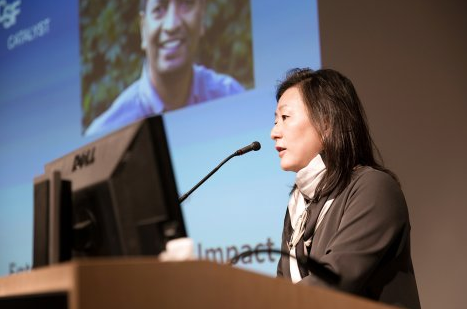
By Mike Billings via UCSF.edu
Ten years after the QB3 Garage incubator launched in a small room at UC San Francisco’s Mission Bay campus, the idea has grown an innovation ecosystem and become the catalyst for state legislation that could help turn ideas at University of California campuses into job-providing companies.
The incubator model that was once called a quixotic venture has grown to be a prime example of why the state should invest $66 million to UC campuses for innovation and entrepreneurship programs, said Assemblywoman Jacqui Irwin, D-Thousand Oaks, who is sponsoring the legislation.
The proposed bill would build on the successes of the UC schools in their innovation and entrepreneurship programs by giving each of the 10 universities and the Lawrence Berkeley National Laboratory $2 million per year for three years.
. . .
Expanding Entrepreneurship at UCSF
The push to help form companies at UCSF hasn't remained solely in the realm of QB3. In the 10 years since the Garage opened, several programs have launched to help turn research and ideas into companies.
While QB3 is working with startups with marketable concepts, others at UCSF are working with researchers at an earlier stage.
One program is Catalyst, which is run out of the UCSF Clinical & Translational Science Institute. The goal of Catalyst, which launched in 2010, is to help take research and put it onto the rails that could lead to a product and patient benefit, said Catherine Tralau-Stewart, PhD, the associate director of therapeutics for Catalyst.
The program is multipronged, reaching out to researchers across UCSF, providing project specific mentoring from matched industry advisors linked with small amounts of targeted funding to progress the project toward proof of concept, product development, and help to form business or partnership proposals to progress the project.
All of the entrepreneurs that Catalyst works with are pre-incorporation and pre licensing, so they aren't businesses yet. The goal, Tralau-Stewart said, is to find the best ideas in therapeutics, digital health, devices and diagnostics at UCSF and help the people behind the ideas transition them to the clinic and into marketable products.
“Catalyst helps investigators to find an optimal path for their innovation to turn into a product, be it through a startup formation or through a collaboration or licensing opportunity to an existing company,” said June Lee, MD, director of Catalyst.
That goal of helping entrepreneurs is shared by UCSF Innovation, Technology & Alliances (ITA). The department helps entrepreneurs with ideas not quite ready for prime time get it there, said Jim Kiriakis, interim director of ITA.
The services ITA offers include entrepreneurship classes and access to mentors who can help the researchers or faculty understand if they have a viable business opportunity, said Stephanie Marrus, director of ITA's Entrepreneurship Center.
